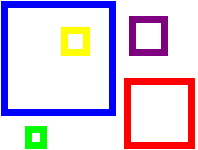Empty Squares

| No. of Players: | 2 |
| Type of Game: | written |
| What you need: | pen and paper |
Goal
To find empty squares in a grid of letters.
How to play
Players draw a grid of, say, 12×12 squares. The grid size can be adjusted according to how long of a game the players want. The players then alternately write a letter in one of the squares in a way that either completes a word horizontally or vertically with adjoining letters, or can potentially be part of a word with the addition of more letters. Players get points for finding squares which must remain devoid of letters because no letter can be placed into it that would make a word with adjoining letters. Once a player believes he has found such an empty square, he claims this square by entering his initials into it. This earns him one point. The other player can challenge this claim by demonstrating how a letter can be placed into it so that a word can be formed with the other letters in the grid. If the challenge is successful, the initials are replaced with the letter and the challenger earns two points. The game is over when neither player is able to enter more letters, or when neither player wants to add more letters because doing so would give the other player a winning number of claimed empty squares.
This game is similar to Grid Words.
Example
The two players draw a grid of 12×12 squares. Anne begins by writing the letter T in a square. Barb writes the letter C fairly close to her opponent's first move, just to keep an eye on her. There is no need for Anne to challenge Barb at this point since she can think of many words like stack, tack, or tick that can be made with these two letters. Anne writes S above the T, as many words can be formed vertically with these letters, like nest or start. Barb writes E to the right of C. Anne writes A below T, thinking of stamina. Barb writes N. Two letters later, the grid looks like this:
The players continue in this manner, thinking of possible words but being hesitant to complete whole words lest their opponent claim an empty square before or after that word. For instance, Anne might avoid writing an I between T and C because she believes that would give Barb the opportunity to claim the square to the left of the word entice. So she would be genuinely surprised when Barb actually does complete this word and would jump at the chance to write her initials to the left of E, thinking no other word is possible. Barb would then successfully challenge her claim by pointing out that apprentice can be formed horizontally. At any rate, other words could be formed that only use the beginning letters of entice, like tent or fallen. It is too early in this particular match to claim an empty square.

